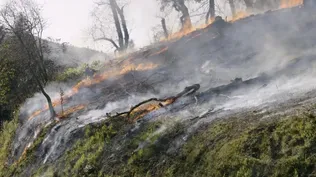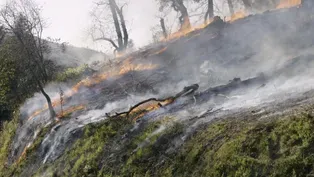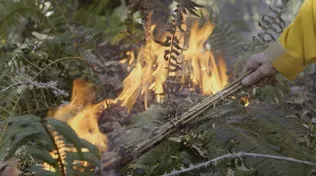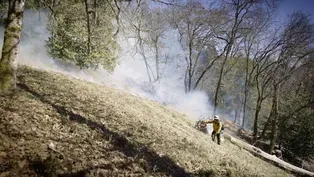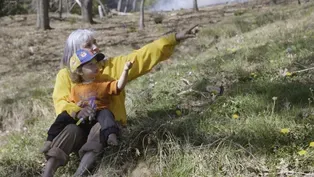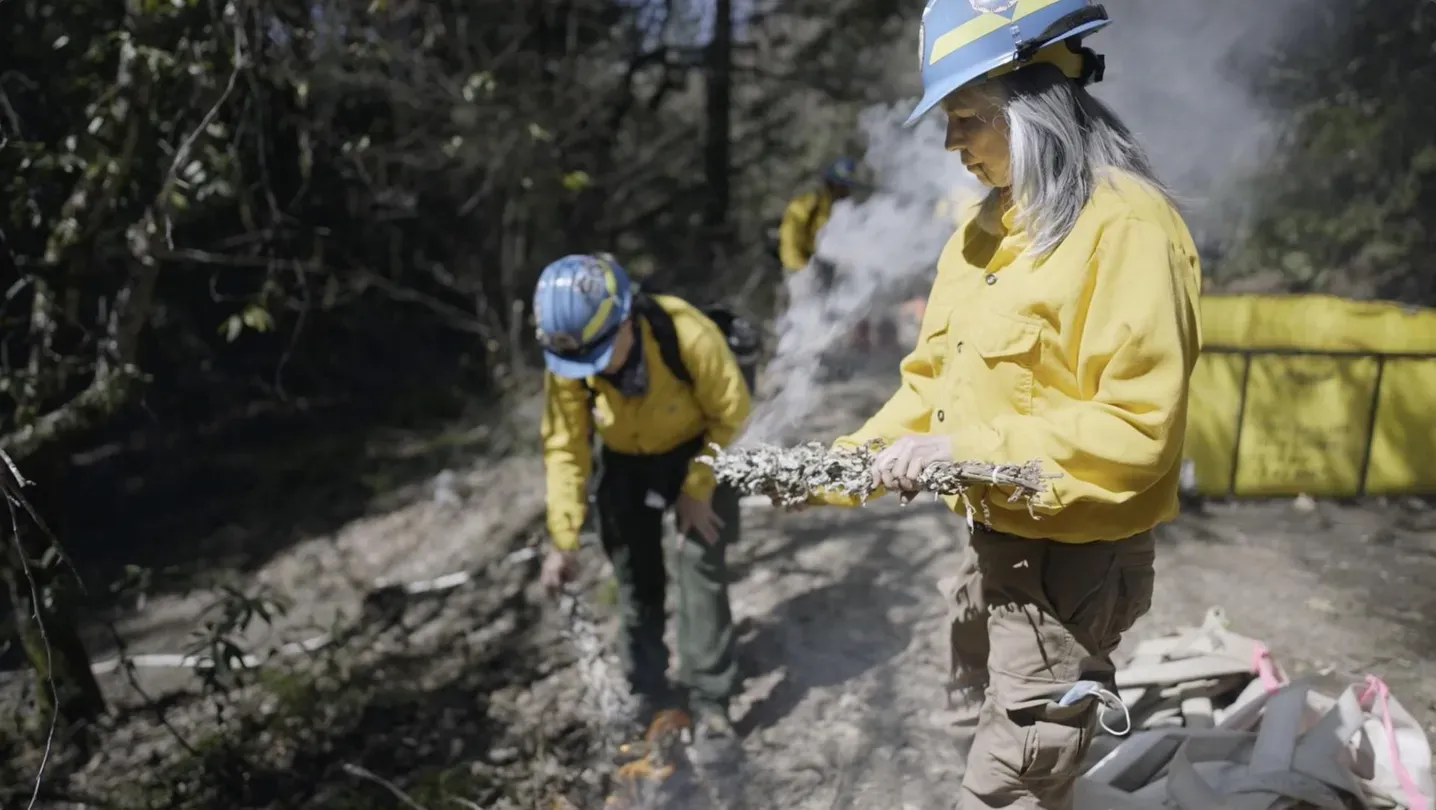

Fire Tender
Season 8 Episode 7 | 27m 41sVideo has Closed Captions
A Yurok knowledge keeper seeks to return fire practices, and restore land and people.
Yurok people have been putting fire on the land since time immemorial...but this practice has been disrupted by California settlers. Catastrophic fires in the West, however, has policymakers rethinking their commitment to fire suppression. FIRE TENDER shares the work of Margo Robbins, a Yurok knowledge keeper, seeking to return practices to Yurok territory, and to restore the land and its people.
Problems with Closed Captions? Closed Captioning Feedback
Problems with Closed Captions? Closed Captioning Feedback
Funding provided by the Corporation for Public Broadcasting, John D. and Catherine T. MacArthur Foundation and Wyncote Foundation.

Fire Tender
Season 8 Episode 7 | 27m 41sVideo has Closed Captions
Yurok people have been putting fire on the land since time immemorial...but this practice has been disrupted by California settlers. Catastrophic fires in the West, however, has policymakers rethinking their commitment to fire suppression. FIRE TENDER shares the work of Margo Robbins, a Yurok knowledge keeper, seeking to return practices to Yurok territory, and to restore the land and its people.
Problems with Closed Captions? Closed Captioning Feedback
How to Watch Local, USA
Local, USA is available to stream on pbs.org and the free PBS App, available on iPhone, Apple TV, Android TV, Android smartphones, Amazon Fire TV, Amazon Fire Tablet, Roku, Samsung Smart TV, and Vizio.
Providing Support for PBS.org
Learn Moreabout PBS online sponsorship(MARGO ROBBINS singing in Yurok language) TINA MCDUFFIE: For generations, the Yurok people have brought fire to the land.
MARGO: Fire is medicine for the but in my lifetime it's been outlawed.
MCDUFFIE: Margo Robbins is fighting to restore this ancient tradition.
MARGO: We are part of nature.
It will take care of us but we, in turn, need to take care of it.
MCDUFFIE: Fire Tender on Local, USA.
♪ ♪ (sounds of the river flowing) (drumming beat) (MARGO ROBBINS singing in Yurok language) (Singing in Yurok language continues) (fire crackling) I hear it crackling.
(fire crackling) (fire crackling and wind chimes) (fire crackling) Come look, Kenny.
It's red hot.
You see it?
It comes to an instant boil as soon as you put the rocks in there.
Stay back.
It's going to steam.
Stay back.
Look, there's acorns in there.
You see it?
Yep.
Its too hot.
You think it's too hot?
I help grandma.
I help grandma make acorn soup.
Im gonna take this rock out and then you can stir it.
Okay?
Stir that water in.
The origins of cultural burning go back to the beginning of time.
Our very cultural life ways depend on putting fire on the land.
But in my lifetime, it's been outlawed.
When fire was used regularly this land was more than 50% prairie land, grass.
You could look up the hill and see the skyline.
You could see between the trees.
You could walk the prairies for miles.
The river was twice as big.
They said during salmon runs you could walk across the river on the backs of the salmon.
Deer were plentiful because the land was healthy and hospitable.
But when we don't have prairies, the animals, they don't have a viable place to live.
And they're supposed to be here.
Now our forest is like a teenager who never cleans his bedroom.
You can't really walk through it.
You can't even see what's really there.
We are a part of nature and we actually have a responsibility to take care of the environment.
It will take care of us but we, in turn, need to take care of it.
And one of the ways we're supposed to take care of a landscape is with fire.
When the fire comes through and burns up all those things that are smothering the earth, imagine how the earth feels to be able to feel the sun shine on it again.
Or when it gets its first drink of water.
You guys are all fire doctors.
Fire is medicine for the land.
I'm thankful for those wogey spirit beings that gave us fire.
I'm thankful for the people that held on to the knowledge of how to use fire and passed it down through the generations.
I'm thankful for the wind that carries the fire, but does not blow so hard that it escapes the place we intended.
I'm thankful for the rain that makes things grow and the sun that dries them out so they'll accept fire in a good way, a way of restoration and new life.
You're here.
We're going to apply the medicine to the land.
(Man singing in Yurok language) (fire crackling) How many do we have watching for embers?
All of us here.
Okay.
Copy.
There's a house up above here.
Yeah.
That lady just passed by.
Yeah, well, and there's another one between there and here so make sure we don't lose any neighbors.
In the early 1900s any kind of fire was considered a threat.
They used to just shoot Native people if they saw them burning.
My teeth are going to hurt from smiling.
This is good.
The government made laws against being able to use fire as a land management tool.
Today, if people were caught using fire to take care of the land they could be sent to prison.
And I know people that went to prison for burning.
Government agencies and legislators are finally realizing that their fire suppression policy was a dire mistake.
They have turned to Native tribes to learn about what we have been doing for thousands and thousands and thousands of years using fire to keep the land healthy and in balance.
And of course, what they care about most, reducing wildfires.
What?
Look, fire.
Mech.
Fire.
Yeah.
Mech ke-nes.
All right Kenny boy, we're going to have to move, buddy.
It's going to get hot here.
Hot.
Yeah, its gonna get hot.
Fire.
Mech.
Mech ke-nes.
It's really been a dream and a goal for me to have the Yurok, Karuk, and Hupa tribes working together.
Having us all out here today restoring our ancestral territory, look at this.
Look what we did.
Thank you, everybody, so much from the bottom of my heart.
And just remember, you made history today.
There's been never any time in history that the Karuk, the Yurok, and the Hupa have burned together.
The three tribes implemented the project with the help of a few neighbors.
The landowner allowed us to be here.
Thank you.
And then we also have our next generation young person cruising around here also and family was present.
And then we also have storytellers that are here with us who will be able to share what we did today.
I think we burned approximately 25 acres.
Number one, you have your fire protection, you have your insect reduction, you have all of your Native first foods rejuvenated, revigored, and you have this beautiful oak woodland meadow now.
We are doing much more than just reducing the amount of brush.
We are restoring the land.
And when the land is healthy, the people will be healthy, and so we're so grateful that you guys are here and for those of you who are coming from the neighboring tribes, know that if you want or need us to come help you burn up in your territory, we'll be there.
Not today, Margo.
Not today?
We're going to go to a place that we burned a month ago and we're going to see what's growing there, so you can point them out to us.
Okay.
Can anybody find a hazel bush that is dead but with new parts growing on the bottom?
You found one, Michael?
This is so amazing.
A month later and all this stuff is growing here.
It is so cool.
Look at all that wormwood up there.
You guys see it?
Go pick a small piece.
Which one is wormwood?
Smell them and try to find out which one smells like it would be good medicine.
That's soap root.
Yeah.
Should we dig up a bulb?
All right.
There you go.
Someday Rewah is going to be the one teaching everybody.
Soap, wow.
Soaps gonna wash your hands.
Soap.
So look how soapy it is.
Thats awesome.
We made natural soap!
Anybody else want to try some soap?
♪ ♪ The land has a memory of fire.
Even though it's been nearly a hundred years, many places have not felt it.
A lot of species benefit from fire, but some require fire to reproduce, and hazel is one of them.
It'll get bigger and bushier but it requires fire to send up the new shoots and we need those long straight shoots to use as the frame of our baskets.
Baskets are an essential part of who we are as Yurok people.
We use baskets to fish with in the river.
When our babies are born, they're held in baskets.
I think that it reminds them of the womb because they're all in there cozy and secure.
Also, we use baskets to lift up prayer.
And so our community decided that bringing fire back to the land was the number one priority.
And that was how we started down this course of reclaiming our right to use fire.
Gram.
Nice.
Look at the green leaves on it.
Yep.
Look, that one has a fire scar.
That one has a fire scar.
See it burned hot in here.
That's why there's hardly no brush.
I like that because then it's so easy to get to the sticks.
Look at that a nice little weaver.
Yep.
Perfect weaver.
Oh, look at these.
I think I got him beat!
Its because my hand is longer, huh?
Our first burn for hazel sticks was seven years ago.
I was about to become a grandma for the first time, and I was determined that my grandbabies would be carried in traditional baby baskets.
I had some sticks that had been given to me from my grandma.
She was a master basket weaver.
But I didn't have enough to make baby baskets.
So it is of personal interest to me to make sure that we have fire.
Then as we started going down this path, we started understanding the enormity of all the effects, bringing fire back.
It's not just basket weaving, it's food and medicine and water and people.
♪ ♪ (Man singing in Yurok language) Fire tender.
Spiritual, cultural, homeland defender.
Earth mender.
Prayer sender.
Given a spark from the very first flame, theyve been keeping the home fire burning since the first day they came.
Fire tender.
Yôotva, yotva, yôotva.
(fire crackling) Fire is a spirit.
And we're a spirit too.
It speaks to us at that deep spiritual level.
I am yearning to know it better.
And as I learn, I share what I learn.
We have had this traumatic history that caused this huge gap in our knowledge of who we are.
I see our kids in every different kind of state from very healthy and well adapted to not.
Aawok Tom Willson, he said that restoration of the land is restoration of the people.
Reconnecting to the land is a critical piece of re-learning who were meant to be as a Yurok people.
And fire enables us to reconnect to those cultural practices.
I really look forward to the day when our communities are healthy again.
Whether it is weaving a basket or catching fish from the river.
People have acorns in their cupboard ready to cook.
They're out gathering wild potatoes from the prairies that they know about how to gather and prepare traditional medicine.
How wonderful will that be?
(fire crackling) (fire crackling)
Video has Closed Captions
Preview: S8 Ep7 | 30s | A Yurok knowledge keeper seeks to return fire practices, and restore land and people. (30s)
Fire Tender | Restorative Fire
Video has Closed Captions
Clip: S8 Ep7 | 1m 44s | For Native tribes like the Yurok, bringing fire back to the land is essential to life. (1m 44s)
Fire Tender | The Native Practice of Controlled Burns
Video has Closed Captions
Clip: S8 Ep7 | 1m | For Native tribes, controlled burns were banned by the government but is now being put to practice. (1m)
Video has Closed Captions
Preview: S8 Ep7 | 1m 10s | A Yurok knowledge keeper seeks to return fire practices, and restore land and people. (1m 10s)
Providing Support for PBS.org
Learn Moreabout PBS online sponsorshipSupport for PBS provided by:
Funding provided by the Corporation for Public Broadcasting, John D. and Catherine T. MacArthur Foundation and Wyncote Foundation.
